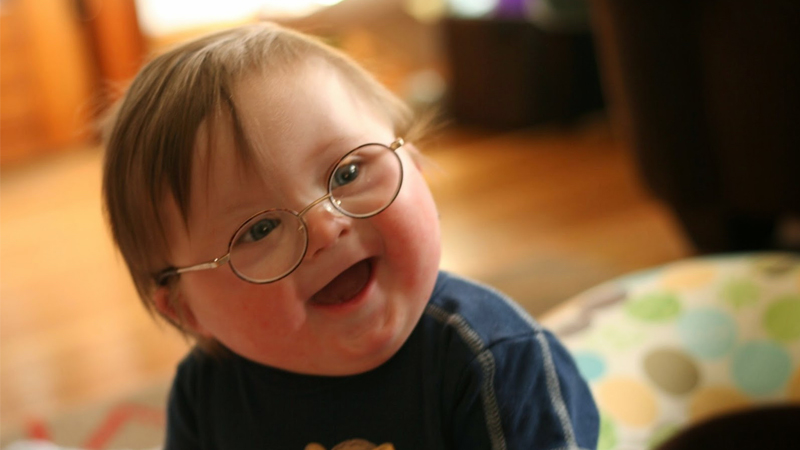
It really intrigues me the way people look at Down Syndrome in our society. It’s similar to the scene from Circus, where so called ‘normal beings’ gather as enthralled viewers to please their eyes and feed their ‘self-esteem’ by mocking that ‘victim’ who stands there unaware of all that is happening around.
It’s crystal clear that we as a nation have failed in providing basic facilities to people who are differently able but what hurts more is the hideous lens through which we see them – an object of pity and a lesson. We need to understand that they are able and normal in their own way, different than ours.
Interestingly, in our society being human is not enough for the hierarchy of perfection never ends. To earn respect as a human, one has to be of a certain criterion. Keeping in view our patriarchal setup, it is preferred that one should be born a ‘man’ to earn real respect. But if the fetus fails to be ‘smart’ enough, then being a woman is still somewhat bearable that too with numerous *terms & conditions applied. And so, it is necessary to be one of the defined genders i-e male or female, to be acceptable in our society. Afterwards what counts is that one should be heterosexual in nature or else will be marginalized and oppressed. After that comes the physical fitness, no matter how violent or raging a person is but at least should be physically fit, i-e able to walk and move. Moreover, no matter how abusive or offensive he is with words yet should be able to talk in a language that one can comprehend. If you get an A in the above mentioned yardstick of perfection then Congratulations! You’re one normal human being who’ll be given respect no matter what! On the contrary, if you deviate from the path of this above mentioned touchstone, then my poor little fella, you need to be really careful, as here, being ‘normal’ is wished over being ‘humane’.
For lots of us, disabled people are not our teachers, or our doctors, or our manicurists. We (physically challenged) are not real people. We are there to inspire. But I’m afraid I’m not here to inspire you. Thank you very much! – Stella Young (TedX)
When talking about people without disabilities, it is okay to say “people without disabilities.” But do not refer to them as “normal” or “healthy.” These terms can make people feel as though there is something wrong with them and that they are “abnormal.”
Getting on in years amidst three siblings with Down Syndrome, for sure, made them native who saw me as an alien. An alien born in the tribe of supernormal kids. And I was the odd one out. Although I had survived the grouping of extra chromosomes yet I was not born special instead I was born ordinary among the extraordinaries. I did not have to adjust among them instead they had to. They were the ones who let me merge among them, who shared their land with me. “They”, my sister and two brothers. I always had been a leaf surrounded by flowers – not one but three. Since childhood, I have been seeing people reacting to Down Syndrome as, “Haye, kash yeh chal saktey – Yeh toh bohat mushkil hoti ho gi – Allah maaf krey – Kaash aik beta theek hota”.
But Hey! Hold on. I wish humans had been smart enough to see that people with Down Syndrome are more humane than us. They are better than us. They harm none. Neither do they gossip, nor abuse. Neither they lie nor they steal. Neither they oppress nor they abuse. But with that innocent smile, they know how to love and be loved.
I feel that, regardless of all the advancement prevailing in our society, there is still a dire need of educating our youth with the proper ethics to be followed when dealing with people who are differently-able.
To make it easy let me share the general guidelines which I came across while browsing through the Internet few days ago.
General Guidelines for Talking about Down Syndrome:
Refer to a person’s condition only when it is related to what you are talking about. For example, don’t ask “What’s wrong with you?” Don’t refer to people in general or generic terms such as “the girl in the wheelchair.”
When talking about places with accommodations for people with Down Syndrome, use the term “accessible” rather than “disabled” or “handicapped.” For example, refer to an “accessible” parking space rather than a “disabled” or “handicapped” parking space or “an accessible bathroom stall” rather than “a handicapped bathroom stall.”
Take the following terms out of your vocabulary when talking about or talking to people with down syndrome. Don’t use the terms “handicapped,” “differently-abled,” “cripple,” “crippled,” “victim,” “retarded,” “stricken,” “psycho,” “unfortunate,” or “special needs.”
Just because someone has Down Syndrome, it doesn’t mean he/she is “courageous,” “brave,” “special,” or “superhuman.” People with disabilities are the same as everyone else. It is not unusual for someone with Down Syndrome to have talents, skills, and abilities.
When talking about people without disabilities, it is okay to say “people without disabilities.” But do not refer to them as “normal” or “healthy.” These terms can make people feel as though there is something wrong with them and that they are “abnormal.”
So next time if you see any Down Syndrome person, know that he deserves the same amount of respect and dignity as you do. Can be even more. But not less. Not at all.
Published in Daily Times, December 2nd 2018.